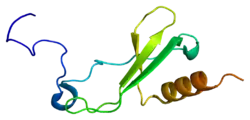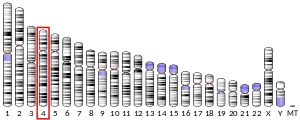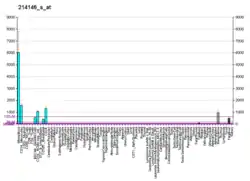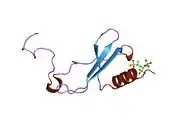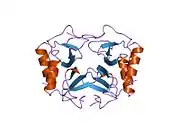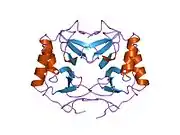CXCL7
Chemokine (C-X-C motif) ligand 7 (CXCL7) is a human gene.[3]
The encoded protein, Chemokine (C-X-C motif) ligand is a small cytokine belonging to the CXC chemokine family. It is an isoform of Beta-Thromboglobulin or Pro-Platelet basic protein (PPBP).[4]
It is a protein that is released in large amounts from platelets following their activation.[5] It stimulates various processes including mitogenesis, synthesis of extracellular matrix, glucose metabolism and synthesis of plasminogen activator.[6][7]
References
- GRCh38: Ensembl release 89: ENSG00000163736 - Ensembl, May 2017
- "Human PubMed Reference:". National Center for Biotechnology Information, U.S. National Library of Medicine.
- "Entrez Gene: PPBP pro-platelet basic protein (chemokine (C-X-C motif) ligand 7)".
- Hristov M, Zernecke A, Bidzhekov K, et al. (March 2007). "Importance of CXC chemokine receptor 2 in the homing of human peripheral blood endothelial progenitor cells to sites of arterial injury". Circ. Res. 100 (4): 590–7. doi:10.1161/01.RES.0000259043.42571.68. PMID 17272812.
- Majumdar S, Gonder D, Koutsis B, Poncz M (1991). "Characterization of the human beta-thromboglobulin gene. Comparison with the gene for platelet factor 4". J Biol Chem. 266 (9): 5785–9. PMID 1826003.
- Castor C, Miller J, Walz D (1983). "Structural and biological characteristics of connective tissue activating peptide (CTAP-III), a major human platelet-derived growth factor". Proc Natl Acad Sci USA. 80 (3): 765–9. doi:10.1073/pnas.80.3.765. PMC 393460. PMID 6572368.
- Castor C, Furlong A, Carter-Su C (1985). "Connective tissue activation: stimulation of glucose transport by connective tissue activating peptide III". Biochemistry. 24 (7): 1762–7. doi:10.1021/bi00328a029. PMID 4005226.
Further reading
- Begg GS, Pepper DS, Chesterman CN, Morgan FJ (1978). "Complete covalent structure of human beta-thromboglobulin". Biochemistry. 17 (9): 1739–44. doi:10.1021/bi00602a024. PMID 77677.
- Kaplan KL, Broekman MJ, Chernoff A, et al. (1979). "Platelet alpha-granule proteins: studies on release and subcellular localization". Blood. 53 (4): 604–18. doi:10.1182/blood.V53.4.604.604. PMID 426909.
- Tunnacliffe A, Majumdar S, Yan B, Poncz M (1992). "Genes for beta-thromboglobulin and platelet factor 4 are closely linked and form part of a cluster of related genes on chromosome 4". Blood. 79 (11): 2896–900. doi:10.1182/blood.V79.11.2896.bloodjournal79112896. PMID 1316786.
- Cohen AB, Stevens MD, Miller EJ, et al. (1992). "Generation of the neutrophil-activating peptide-2 by cathepsin G and cathepsin G-treated human platelets". Am. J. Physiol. 263 (2 Pt 1): L249–56. doi:10.1152/ajplung.1992.263.2.L249. PMID 1387511.
- Morris SW, Nelson N, Valentine MB, et al. (1992). "Assignment of the genes encoding human interleukin-8 receptor types 1 and 2 and an interleukin-8 receptor pseudogene to chromosome 2q35". Genomics. 14 (3): 685–91. doi:10.1016/S0888-7543(05)80169-7. PMID 1427896.
- Majumdar S, Gonder D, Koutsis B, Poncz M (1991). "Characterization of the human beta-thromboglobulin gene. Comparison with the gene for platelet factor 4". J. Biol. Chem. 266 (9): 5785–9. PMID 1826003.
- Wenger RH, Hameister H, Clemetson KJ (1991). "Human platelet basic protein/connective tissue activating peptide-III maps in a gene cluster on chromosome 4q12-q13 along with other genes of the beta-thromboglobulin superfamily". Hum. Genet. 87 (3): 367–8. doi:10.1007/BF00200921. PMID 1830861. S2CID 19420329.
- Hjemdahl P, Perneby C, Theodorsson E, et al. (1992). "A new assay for beta-thromboglobulin in urine". Thromb. Res. 64 (1): 33–43. doi:10.1016/0049-3848(91)90203-9. PMID 1837963.
- Brandt E, Van Damme J, Flad HD (1991). "Neutrophils can generate their activator neutrophil-activating peptide 2 by proteolytic cleavage of platelet-derived connective tissue-activating peptide III". Cytokine. 3 (4): 311–21. doi:10.1016/1043-4666(91)90499-4. PMID 1873479.
- Clark-Lewis I, Moser B, Walz A, et al. (1991). "Chemical synthesis, purification, and characterization of two inflammatory proteins, neutrophil activating peptide 1 (interleukin-8) and neutrophil activating peptide". Biochemistry. 30 (12): 3128–35. doi:10.1021/bi00226a021. PMID 2007144.
- Walz A, Baggiolini M (1990). "Generation of the neutrophil-activating peptide NAP-2 from platelet basic protein or connective tissue-activating peptide III through monocyte proteases". J. Exp. Med. 171 (2): 449–54. doi:10.1084/jem.171.2.449. PMC 2187709. PMID 2406364.
- Holt JC, Harris ME, Holt AM, et al. (1986). "Characterization of human platelet basic protein, a precursor form of low-affinity platelet factor 4 and beta-thromboglobulin". Biochemistry. 25 (8): 1988–96. doi:10.1021/bi00356a023. PMID 2423119.
- Walz A, Baggiolini M (1989). "A novel cleavage product of beta-thromboglobulin formed in cultures of stimulated mononuclear cells activates human neutrophils". Biochem. Biophys. Res. Commun. 159 (3): 969–75. doi:10.1016/0006-291X(89)92203-1. PMID 2522778.
- Wenger RH, Wicki AN, Walz A, et al. (1989). "Cloning of cDNA coding for connective tissue activating peptide III from a human platelet-derived lambda gt11 expression library". Blood. 73 (6): 1498–503. doi:10.1182/blood.V73.6.1498.1498. PMID 2713489.
- Castor CW, Walz DA, Ragsdale CG, et al. (1989). "Connective tissue activation. XXXIII. Biologically active cleavage products of CTAP-III from human platelets". Biochem. Biophys. Res. Commun. 163 (2): 1071–8. doi:10.1016/0006-291X(89)92330-9. PMID 2783111.
- Holt JC, Rabellino EM, Gewirtz AM, et al. (1988). "Occurrence of platelet basic protein, a precursor of low affinity platelet factor 4 and beta-thromboglobulin, in human platelets and megakaryocytes". Exp. Hematol. 16 (4): 302–6. PMID 2966071.
- Castor CW, Furlong AM, Carter-Su C (1985). "Connective tissue activation: stimulation of glucose transport by connective tissue activating peptide III". Biochemistry. 24 (7): 1762–7. doi:10.1021/bi00328a029. PMID 4005226.
- McLaren KM, Pepper DS (1983). "Immunological localisation of beta-thromboglobulin and platelet factor 4 in human megakaryocytes and platelets". J. Clin. Pathol. 35 (11): 1227–31. doi:10.1136/jcp.35.11.1227. PMC 497932. PMID 6183294.
- Castor CW, Miller JW, Walz DA (1983). "Structural and biological characteristics of connective tissue activating peptide (CTAP-III), a major human platelet-derived growth factor". Proc. Natl. Acad. Sci. U.S.A. 80 (3): 765–9. doi:10.1073/pnas.80.3.765. PMC 393460. PMID 6572368.
- Malkowski MG, Wu JY, Lazar JB, et al. (1995). "The crystal structure of recombinant human neutrophil-activating peptide-2 (M6L) at 1.9-A resolution". J. Biol. Chem. 270 (13): 7077–87. doi:10.1074/jbc.270.13.7077. PMID 7706245.
External links
- Human PPBP genome location and PPBP gene details page in the UCSC Genome Browser.
This article is issued from Wikipedia. The text is licensed under Creative Commons - Attribution - Sharealike. Additional terms may apply for the media files.
